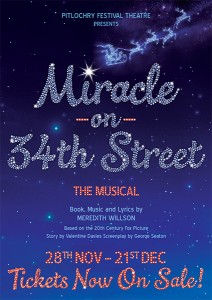 “When you start a play and you type ‘Act one, scene one,’ your writing is every bit as good as Arthur Miller or Eugene O’Neill or anyone,” the composer and playwright Meredith Willson once wrote. “It’s that fifth word where amateurs start to go wrong.”
“When you start a play and you type ‘Act one, scene one,’ your writing is every bit as good as Arthur Miller or Eugene O’Neill or anyone,” the composer and playwright Meredith Willson once wrote. “It’s that fifth word where amateurs start to go wrong.”
Willson, of course, was an experienced professional, whose writing seldom ever went wrong. If he’s no longer quite the household name on either side of the Atlantic, at least many of his songs have become recognisable standards, albeit with a tendency to turn up where you least expect them.
Take, for example, Johnny Mathis’s 1986 cover of “It’s Beginning to Look A Lot Like Christmas,” a song Willson wrote back in 1951 and subsequently included in Miracle on 34th Street; it’s popularity is thanks chiefly to its inclusion in Home Alone 2: Lost in New York. Then there’s the fitness-themed “Chicken Fat” song which Willson wrote for President Kennedy’s Council on Physical Fitness in 1962, resurrected this year by Apple for a US advertising campaign showing how the latest iPhones can help monitor your health!
Born in Mason City, Iowa on 18 May 1902, Willson was the youngest child of lawyer John David Willson and primary school teacher Rosalie (née Reiniger). While elder sister Dixie would become a successful screenwriter and author of children’s book, Willson appears to have inherited his musical talent from his mother, a piano tutor.
Willson attended Frank Damrosch’s Institute of Musical Art (later the Julliard School) in New Work City. A flute and piccolo player, he then played in John Philip Sousa’s band between 1921 and 1923, before joining the New York Philharmonic Orchestra under the baton of Arturo Toscanini.
In 1929 he and wife Elizabeth—they had married in 1920—moved to San Francisco, California, where he worked as a concert director for radio station KFRC, and then musical director for the NBC radio network. He also began composing for films, picking up two Academy Award nominations for The Great Dictator (1941) and The Little Foxes (1942).
After the Second World War, during which he served in the US Armed Forces Radio Service, Willson focused on US network radio in a succession of comedy-variety shows hosted by the actress Talulah Bankhead (for whom he wrote the song “May the God Lord Bless and Keep You”) and comedian Jack Benny.
A long-standing ambition, however, was to write and compose a musical inspired by his Iowan childhood. It would take nearly eight years, during which time he wrote almost 40 songs (22 of which were cut) before the first production of The Music Man, co-written with playwright Franklin Lacey, opened in December 1957 on Broadway.
That original production won five Tony Awards (including “Best Musical”) and a Grammy for its cast album recording. A film adaptation followed in 1962; two years later, his second musical The Unsinkable Molly Brown also received the cinematic treatment. This process was reversed, however, with Here’s Love (1963), adapted from the 1947 film Miracle On 34th Street, and now usually retitled after it.
The ongoing popularity of Willson’s material can be seen not just in the subsequent revivals of his shows but also in how, by 1962, one of his most-covered songs, “Till There Was You”, had attracted the attention of a young singer-songwriter and had become a regular inclusion on his band’s playlist. From Hamburg’s Star Club to a Royal Command Performance—as well as on their second studio album, released in 1963—Meredith Willson’s legacy was given just a little extra boost by… Paul McCartney and the Beatles!
Published in Pitlochry Festival Theatre brochure for their Winter 2014 production of Miracle on 34th Street.